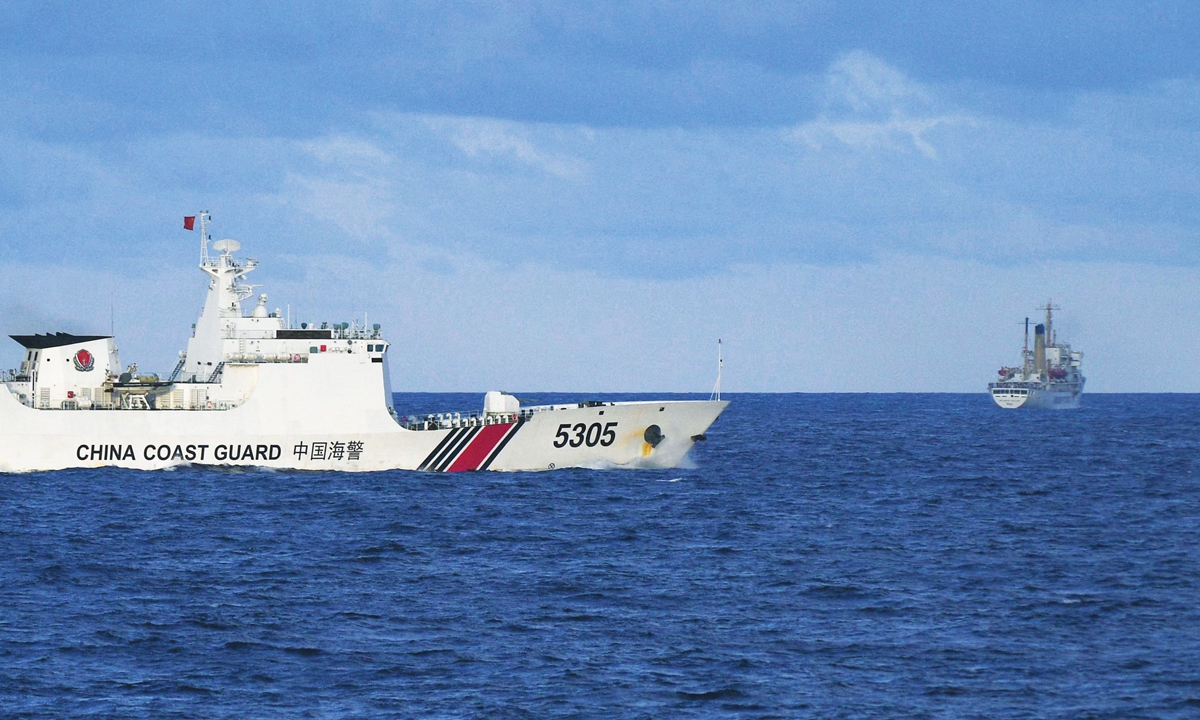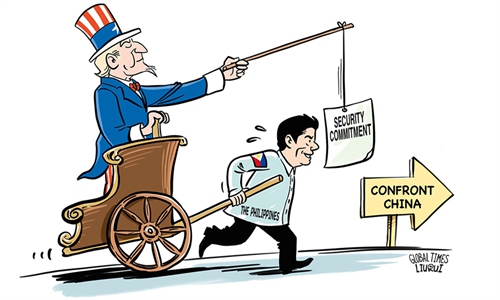Chinese embassy in Philippines raises five questions in refuting Manila's denial of 'agreements' on South China Sea issue

A Chinese Coast Guard ship drives away a Philippine vessel that intrudes into adjacent waters of Ren'ai Jiao in the South China Sea on December 10, 2023. Photo: VCG
After several senior Philippine officials denied that the Marcos administration had negotiated with China to reach "arrangements" on the Ren'ai Jiao (also known as Ren'ai Reef), the Chinese Embassy in the Philippines raised five questions, emphasizing that China has consistently been committed to managing the situation at Ren'ai Jiao, maintaining dialogue with the Philippines in a responsible manner, and reaching internal understandings and arrangements on multiple occasions.
The Philippines has repeatedly denied recently that China and the Philippines had reached "agreements" on the South China Sea issue.
Philippine Defense Secretary Gilberto Teodoro stated that since Philippine President Ferdinand Marcos Jr took office in 2022, the Philippine Defense Department is "not aware of, nor is it a party to, any internal agreement with China."
Philippine National Security Adviser Secretary Eduardo Año also said that there is "no agreement whatsoever" in Ren'ai Jiao between the Philippines and China, saying that this "new model" announced by the Chinese side is nothing more than a new invention, according to the agency.
However, facts speak louder.
China has always been committed to properly managing maritime differences through dialogue and consultation with the Philippines and has made relentless efforts in this regard, the Chinese Embassy said in a statement published on its website on Saturday.
The "gentlemen's agreement" is a concrete outcome of such efforts. To follow up on the important consensus between the two heads-of-state to deescalate tension in the South China Sea, the Chinese side and the Philippine side through AFP WESCOM agreed on a "new model" for the management of the situation at Ren'ai Jiao early this year after multiple rounds of discussions.
Either the "gentlemen's agreement" or the "new model" is a confidence-building measure aimed at managing disputes, avoiding conflicts and maintaining peace, and has nothing to do with each other's sovereign positions, the embassy said.
During the discussion the AFP WESCOM has made repeated confirmation that the "new model" has been approved by all key officials in the Philippine chain of command, including the Secretary of National Defense and the National Security Advisor.
The communication and negotiation on this subject matter is kept on record in every detail by the Chinese side. Thanks to the "new model," frontliners of both sides had guidance to follow on how to interact with each other, which made the resupply mission on last February 2 a smooth one.
The AFP Spokesperson described this resupply mission as "flawless" in a post on social media X on the same day. Positive efforts of the frontliners in this regard are commendable, the embassy said.
China has always attached great importance to communication and dialogue with the Philippine DND and the AFP. In fact, on July 5, 2023, Chinese Ambassador to the Philippines had the honor to pay a courtesy call on Defense Secretary Gilberto C. Teodoro Jr. at Camp Aguinaldo, exchanged views with the latter on China-Philippines military relations, and maritime issues, among other things.
During the meeting, the Philippine side was briefed on the "gentlemen's agreement" on the management of Ren'ai Jiao. Readouts of the meeting were released respectively by the DND and the Chinese Embassy in the Philippines, the embassy spokesperson said.
The above are facts, not narratives, nor inventions. China is always committed to managing the situation at Ren'ai Jiao and maintaining dialogue and communication with the Philippines in a responsible manner, the spokesperson noted, adding it is regrettable that despite the internal understandings and arrangements, peace and tranquility was disrupted again and again at Ren'ai Jiao.
The Chinese Embassy put five questions to the Philippines: Why the Marcos administration repeatedly denies having negotiated with China to reach understandings and arrangements on Ren'ai Jiao?
Why does the Philippine Department of National Defense refuse to engage in dialogue and negotiation with China to properly handle maritime disputes?
The "new model" has been proven to be effective in managing differences and avoiding conflicts, why has the current Philippine government unilaterally abandoned it after being put into practice only once?
Who made the decision to betray the "new model"?
Does managing differences and avoiding conflicts go against the interests of certain forces?
Global Times

